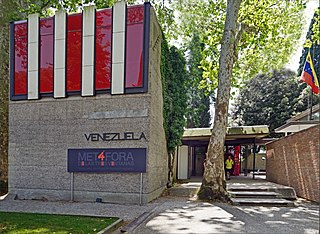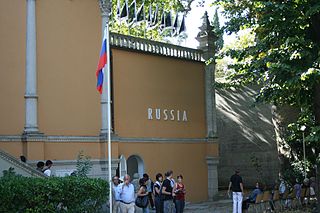Related Research Articles

The Venice Film Festival or Venice International Film Festival is an annual film festival held in Venice, Italy. It is the world's oldest film festival and one of the "Big Five" International film festivals worldwide, which include the Big Three European Film Festivals, alongside the Toronto Film Festival in Canada and the Sundance Film Festival in the United States.These festivals are internationally renowned for giving creators the artistic freedom to express themselves through film. In 1951, FIAPF formally accredited the festival.

The Venice Biennale is an international cultural exhibition hosted annually in Venice, Italy by the Biennale Foundation. The biennale has been organised every year since 1895, which makes it the oldest of its kind. The main exhibition held in Castello, in the halls of the Arsenale and Biennale Gardens, alternates between art and architecture. The other events hosted by the Foundation—spanning theatre, music, and dance—are held annually in various parts of Venice, whereas the Venice Film Festival takes place at the Lido.

The Golden Lion is the highest prize given to a film at the Venice Film Festival. The prize was introduced in 1949 by the organizing committee and is now regarded as one of the film industry's most prestigious and distinguished prizes. In 1970, a second Golden Lion was introduced; this is an honorary award for people who have made an important contribution to cinema.

The Volpi Cup for Best Actress is an award presented by the Venice Film Festival. It is given by the festival jury in honor of an actress who has delivered an outstanding performance from the films in the competition slate. It is named in honor of Count Giuseppe Volpi di Misurata, the founder of the festival. The 1st ceremony was held in 1932, when Helen Hayes received the Volpi Cup for the title role in The Sin of Madelon Claudet (1931)—this was the only time that the award was chosen by public voting. From 1942 to 1945, the festival was suspended because of World War II. The student protests in May 1968 opened a period of institutional changes, with no prizes were awarded from 1969 to 1979.

The Angolan pavilion, representing the nation of Angola, has participated in the Venice Biennale since 2013. As one of the biennial international art exhibition's national pavilions, Angola mounts a show in a Venetian palazzo outside Venice's Giardini. The first Angolan pavilion, which featured the photography of Edson Chagas, became the first African national pavilion to receive the biennial's top prize, the Golden Lion for best national pavilion. Chagas displayed poster-sized photographs of resituated, abandoned objects and weathered architecture in the Angolan capital of Luanda. Reviewers praised the interplay between the photographed subject matter and the Italian Renaissance artwork that adorned the hosting palazzo's walls. The 2015 Biennale hosted a group show of five Angolan artists on themes of intergenerational dialogue.
Ila Bêka and Louise Lemoine are two architectural artists and filmmakers. Their films focus on the relationship of people and design, emphasising the presence of everyday life within some of the most iconic architectural projects of recent decades. Bêka's and Lemoine's complete work has been acquired in 2016 by MoMA, Museum of Modern Art in New York, and is now part of its permanent collection.
The American pavilion is a national pavilion of the Venice Biennale. It houses the United States' official representation during the Biennale.
The 32nd Venice Biennale, held in 1964, was an exhibition of international contemporary art, with 34 participating nations. The Venice Biennale takes place biennially in Venice, Italy. Winners of the Gran Premi included American painter Robert Rauschenberg, Swiss sculptor Zoltan Kemeny, German draughtsman Joseph Fassbender, and Italian sculptors Andrea Cascella, sculptor Arnaldo Pomodoro, and etcher Angelo Savelli.

The national pavilions host each participant nation's official representation during the Venice Biennale, an international art biennial exhibition held in Venice, Italy. Some countries own pavilion buildings in the Giardini della Biennale while others rent buildings throughout the city, but each country controls its own selection process and production costs.

The Australian pavilion is a structure that houses Australia's national representation during the Venice Biennale arts festival. Although Australia has been represented at the festival since 1954, the first pavilion was only built in 1987, and replaced by a permanent structure in 2015.

The Canadian pavilion houses Canada's national representation during the Venice Biennale arts festivals.

The Brazilian pavilion houses Brazil's national representation during the Venice Biennale arts festivals.

The Venezuelan pavilion houses Venezuela's national representation during the Venice Biennale arts festivals. It is located in the Giardini della Biennale.

The Uruguayan pavilion houses Uruguay's national representation during the Venice Biennale arts festivals.

The Serbian pavilion houses Serbia's national representation during the Venice Biennale arts festivals.

The Russian pavilion houses Russia's national representation during the Venice Biennale arts festivals.

The Finnish pavilion houses Finland's national representation during the Venice Biennale arts festivals.
Amei Wallach is an American filmmaker, art critic journalist, and author from New York. Her documentaries profiling artists include: Louise Bourgeois: The Spider, The Mistress and the Tangerine (2008), Ilya and Emilia Kabakov: Enter Here (2013), and Taking Venice. Her writings have appeared in the New York Times, Smithsonian, Vanity Fair, and Art in America, and numerous publications. From 2000 to 2005, Wallach served as president of the U.S. Section of the International Association of Art Critics (AICA/USA).
Becoming Led Zeppelin is a 2021 documentary film directed by Bernard MacMahon which traces the formation and early years of Led Zeppelin. The film is an independent production made with the full co-operation of the band and represents the first time Led Zeppelin have agreed to participate in a biographical documentary. A work-in-progress was screened at the 78th Venice Film Festival in 2021 to a 10-minute standing ovation.
The 60th Venice Biennale is an international contemporary art exhibition held between April and November 2024. The Venice Biennale takes place every two years in Venice, Italy, with some limited exceptions. Artistic director Adriano Pedrosa curated its central exhibition, Foreigners Everywhere, and 88 countries contributed national pavilions.
References
- ↑ Wilkinson, Alissa (May 17, 2024). "'Taking Venice': The Strange Story of the U.S. Government and a Painter" – via NYTimes.com.
- ↑ "Review: Was the 1964 Venice Biennale rigged? The documentary 'Taking Venice' looks at conspiratorial claims". Los Angeles Times. May 20, 2024.